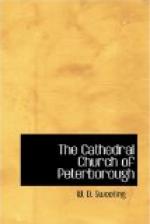pinnacles, that are placed between the gables, are
not placed exactly above the central line of the great
piers beneath them, but are in each case a little
further towards the outer arches; and it will be seen,
immediately that this is pointed out, how much the
upper part of the facade is thereby improved.
The two great piers may be roughly taken as having
for section an isosceles right-angled triangle, the
right angle being towards the west. The mouldings
of the arches are supported by a series of banded
shafts, six on each side of each arch. In the
spaces between the shafts of the middle arch, but
not of the others, are crockets for the whole height,
and the innermost cavetto is entirely filled with
dog-tooth ornament. All the shafts have floriated
capitals; and the great arches have similar mouldings.
Four sets of ornaments run round each arch; a continuous
chevron, a richly floriated roll, a roll with bands,
and a series of billets. Between the arches there
rises a clustered shaft which reaches to the level
of the highest points of the arches: here these
shafts combine with an ornamented stringcourse which
runs in a straight line along the entire front.
In each of the six spandrels are a deeply recessed
quatrefoil, two trefoiled arches (like the upper part
of a niche), a pair of lancet-shaped niches containing
figures, and a beautifully designed hexagonal ornament,
with wavy edges, the cusps uniting in a central boss.
The pinnacles on each side of the middle gable are
at first square, then there are two octagonal stages,
the uppermost pierced, and finally a short spire.
The lowest stage has a double lancet with floriated
capitals; the second has a lancet, also with floriated
capitals, filling up each face of the octagon; the
last stage has round-headed lancets, without capitals,
entirely surrounded by zigzags.
[Illustration: Plan of Central Portion of the
West Front.]
The gables are richly ornamented. At the head
of each is a massive cross of very fine workmanship.
Along the edges of the gables are two rows of billets
and the wavy ornament. Just below the crosses
are three large statues, in niches of which the gable
mouldings form the heads. That in the centre
is S. Peter, with a mitre, the right hand uplifted
in blessing, and two keys in the left hand; the other
two are S. John and S. Andrew. Below plain, straight
stringcourses, at the foot of these statues, are three
rose windows of exceptional grace and beauty.
The central one has eight spokes radiating from a
flat medallion enriched with conventional foliage;
these support trefoil-headed arches which have their
outer mouldings thickly covered with dog-tooth; the
whole is bounded by two circular bands, the inner
one ornamented. The two other rose windows have
six spokes instead of eight, the trefoiled arches have
foliage, and the inner moulding of the bounding circles
is continuously waving. The spokes in all three
windows have the dog-tooth on each side. On each




